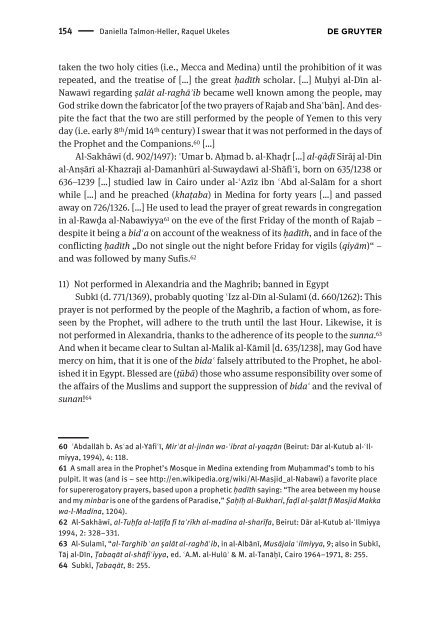0021-1818_islam_98-1-2-i-259
0021-1818_islam_98-1-2-i-259
0021-1818_islam_98-1-2-i-259
Create successful ePaper yourself
Turn your PDF publications into a flip-book with our unique Google optimized e-Paper software.
154 Daniella Talmon-Heller, Raquel Ukeles<br />
taken the two holy cities (i.e., Mecca and Medina) until the prohibition of it was<br />
repeated, and the treatise of […] the great hadith scholar. […] Mu1yi al-D\n al-<br />
Nawaw\ regarding salat al-ragha#ib became well known among the people, may<br />
God strike down the fabricator [of the two prayers of Rajab and Sha^ban]. And despite<br />
the fact that the two are still performed by the people of Yemen to this very<br />
day (i.e. early 8 th/mid 14 th century) I swear that it was not performed in the days of<br />
the Prophet and the Companions. 60 […]<br />
Al-Sakhaw\ (d. 902/1497): ^Umar b. A1mad b. al-Khadr […] al-qadi Siraj al-D\n<br />
al-Ansar\ al-Khazraj\ al-Damanhur\ al-Suwaydaw\ al-Shafi^\, born on 635/1238 or<br />
636–1239 […] studied law in Cairo under al-^Az\z ibn ^Abd al-Salam for a short<br />
while […] and he preached (khataba) in Medina for forty years […] and passed<br />
away on 726/1326. […] He used to lead the prayer of great rewards in congregation<br />
in al-Rawda al-Nabawiyya 61 on the eve of the first Friday of the month of Rajab –<br />
despite it being a bid^a on account of the weakness of its hadith, and in face of the<br />
conflicting hadith „Do not single out the night before Friday for vigils (qiyam)“ –<br />
and was followed by many Sufis. 62<br />
11) Not performed in Alexandria and the Maghrib; banned in Egypt<br />
Subk\ (d. 771/1369), probably quoting ^Izz al-D\n al-Sulam\ (d. 660/1262): This<br />
prayer is not performed by the people of the Maghrib, a faction of whom, as foreseen<br />
by the Prophet, will adhere to the truth until the last Hour. Likewise, it is<br />
not performed in Alexandria, thanks to the adherence of its people to the sunna. 63<br />
And when it became clear to Sultan al-Malik al-Kamil [d. 635/1238], may God have<br />
mercy on him, that it is one of the bida^ falsely attributed to the Prophet, he abolished<br />
it in Egypt. Blessed are (tuba) those who assume responsibility over some of<br />
the affairs of the Muslims and support the suppression of bida^ and the revival of<br />
sunan! 64<br />
60 ^Abdallah b. As^ad al-Yafi^\, Mir#at al-jinan wa-^ibrat al-yaqzan (Beirut: Dar al-Kutub al-^Ilmiyya,<br />
1994), 4: 118.<br />
61 A small area in the Prophet’s Mosque in Medina extending from Mu1ammad’s tomb to his<br />
pulpit. It was (and is – see http://en.wikipedia.org/wiki/Al-Masjid_al-Nabawi) a favorite place<br />
for supererogatory prayers, based upon a prophetic hadith saying: “The area between my house<br />
and my minbar is one of the gardens of Paradise,” Sahih al-Bukhari, fadl al-salat fi Masjid Makka<br />
wa-l-Madina, 1204).<br />
62 Al-Sakhaw\, al-Tuhfa al-latifa fi ta#rikh al-madina al-sharifa, Beirut: Dar al-Kutub al-^Ilmiyya<br />
1994, 2: 328–331.<br />
63 Al-Sulam\, “al-Targhib ^an salat al-ragha#ib, in al-Alban\, Musajala ^ilmiyya, 9; also in Subk\,<br />
Taj al-D\n, Tabaqat al-shafi^iyya, ed. ^A.M. al-Hulu# & M. al-Tana1\, Cairo 1964–1971, 8: 255.<br />
64 Subk\, Tabaqat, 8: 255.


